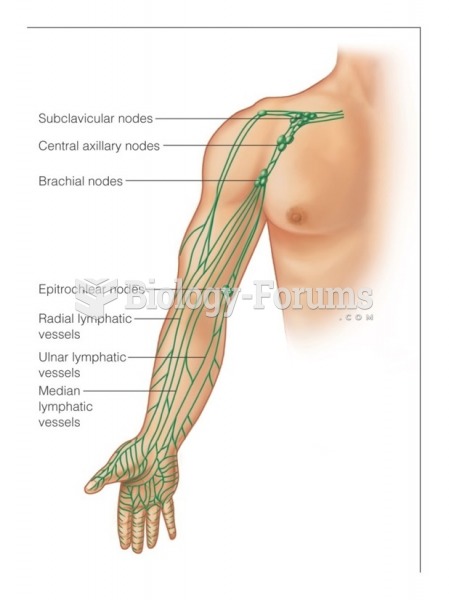Answer to Question 1
Correct Answer: 1,3,4
Rationale 1: An efficient lymph system, including lymph nodes, is essential to good health.
Rationale 2: There is no indication that taking out the majority of lymph nodes in a body region is necessary or possible.
Rationale 3: The macrophages and lymphocytes in the lymph nodes kill, neutralize, or remove pathogens and cancer cells.
Rationale 4: The lymph system is a major contributor to defense against infection.
Rationale 5: It is not possible or desirable to remove all of a client's lymph nodes.
Global Rationale: Lymph nodes are solid, spherical bodies that are packed with macrophages and lymphocytes, which are cells specialized to recognize anything that is non-self or foreign to the body. Recognition of these foreign agents activates the immune response, which neutralizes or removes the pathogens before they can reach the general circulation and which is essential to good health. Each lymph node serves as a mini-filter, removing up to 99 of the foreign agents entering the node. Should a pathogen be clever enough to escape surveillance in a lymph node, it is then faced with passing through dozens, and sometimes hundreds, more lymph nodes in the lymphatic system. There is no indication that taking out the majority of lymph nodes in a body region is necessary or possible.
Answer to Question 2
Correct Answer: 2,4
Rationale 1: Fever is a process barrier of the innate body defenses.
Rationale 2: Complement is one of the process barriers of the innate body defenses.
Rationale 3: Skin and mucous membranes act as physical barriers to invasion by pathogens.
Rationale 4: Dendritic cells are one of the cellular barriers. Dendrites are part of the nervous system, but are not specifically charged with keeping the immune system strong.
Rationale 5: Phagocytes do kill invading bacteria.
Global Rationale: Innate body defenses are those present even before an infection has occurred and that provide the first line of protection from pathogens. These are sometimes referred to as nonspecific defenses because they are unable to distinguish one type of threat from another, the body's response is the same regardless of the particular pathogen. Components of the nonspecific body defenses include physical barriers such as the skin and mucous membranes, cellular barriers such as phagocytes, natural killer cells, and dendritic cells, and process barriers such as complement, fever, and inflammation.







